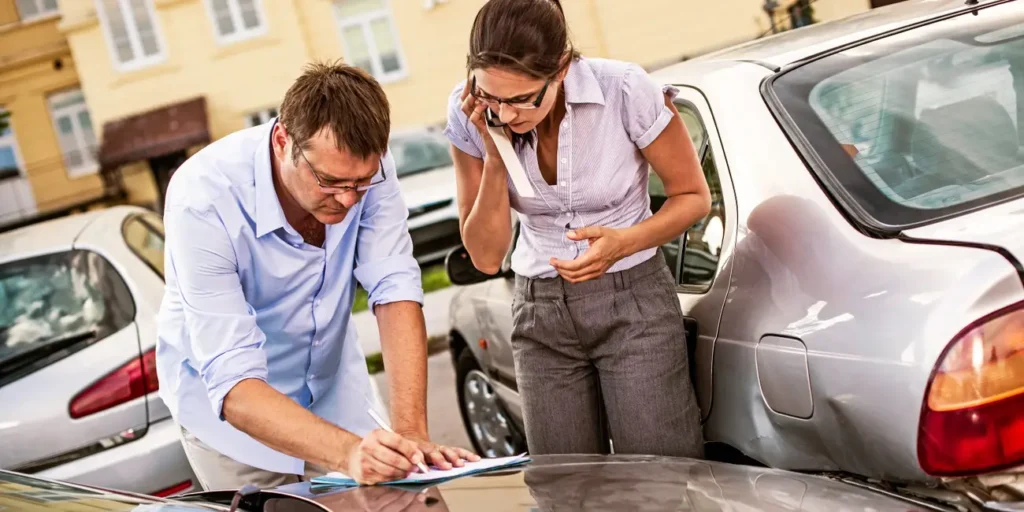So, you’ve just had a car accident. Your heart’s racing, your mind’s spinning, and then—boom—the insurance stuff hits like a second crash. Don’t worry. This guide is here to walk you through the chaos and help you deal with insurance like a pro (without needing a law degree or a stress ball).

1. First Things First: Safety Over Everything
Before we talk insurance, let’s talk survival. Get yourself and others to safety. Pull over (if you can), turn on your hazard lights, and check for injuries. If someone’s hurt, call 911 immediately. Cars can be replaced—people can’t.
2. Call the Cops — Even if It Feels Extra
Even for minor fender benders, having a police report can be a game-changer when it comes to insurance. It’s like having a referee in a boxing match. Without it, it’s your word vs. theirs. With it, you’ve got an official record.
3. Document Everything
Think of yourself as a detective on a crime scene. Snap photos of:
- Vehicle damage (all angles)
- License plates
- Road conditions
- Street signs
- The other driver’s license and insurance card
Take notes too. Write down the time, location, weather conditions, and what happened—before your memory gets foggy.
4. Exchange Info, But Keep It Chill
Get their:
- Full name
- Phone number
- Insurance company and policy number
- Driver’s license number
- License plate
Keep it civil. This isn’t the time to argue or blame. You’re gathering data, not starting drama.
5. Don’t Admit Fault — Just Don’t
Even if you think you messed up, keep it to yourself. Let the pros (like the cops and the insurance adjusters) figure out who’s to blame. Anything you say can—and probably will—be used against you in claim negotiations.
6. What to Tell Your Insurance Company
– Be Honest (But Don’t Overshare)
Call them ASAP. Give them the basic facts:
- What happened
- Where it happened
- Who was involved
- Any injuries
Stick to the facts. Avoid phrases like “It was my fault” or “I didn’t see them.” Just describe what happened.
– Stick to the Facts
Don’t guess. If you’re not sure about something, say that. It’s better to be vague than wrong.
7. When to File a Claim
– Minor Damage: Is It Worth It?
If the damage is tiny and no one’s hurt, it might be cheaper to pay out of pocket—especially if you’re worried about your premiums going up. But get an estimate first.
– Major Damage: File Immediately
If your car’s toast or anyone’s injured, file the claim right away. No debate. This is what insurance is for.
8. Types of Claims You Can File
– At-Fault Claims
You caused the accident. Your insurance pays for the other person’s damages.
– No-Fault Claims
In no-fault states, each driver’s insurance covers their own injuries—regardless of who caused the crash.
– Comprehensive Claims
These are for non-accident stuff like theft, vandalism, falling trees, or that deer that came outta nowhere.
9. What to Expect After Filing a Claim
– Adjusters and Assessments
An adjuster will likely inspect the car, assess the damage, and decide what your insurance will pay. Be cooperative, but remember—they work for the insurance company, not you.
– Timelines and Payouts
Most claims wrap up in a few weeks. If you’re still waiting after a month, it’s okay to follow up and push a little.

10. Should You Talk to the Other Driver’s Insurance?
Only if your insurer tells you to. And if you do, keep it short and sweet. Don’t give a recorded statement without legal advice. Why? Because they’re not your friend—they’re trying to save their company money.
11. What If the Other Driver Is Uninsured?
Hopefully, you’ve got uninsured motorist coverage. If not, things get messier. You might have to sue, or pay out of pocket. This is where that coverage really pays off.
12. Rental Cars and Coverage: What’s the Deal?
Check your policy. Many include rental reimbursement. If the other driver was at fault, their insurance should cover it. Just don’t assume—call and confirm.
13. What If Your Claim Gets Denied?
Take a deep breath. Ask for the reason in writing. Then:
- Review your policy.
- Ask for a second opinion.
- File an appeal.
- Consider a lawyer if it gets shady.
Don’t let them bully you. You’re allowed to push back.
14. Dealing with Delays and Insurance Runaround
If they’re ghosting you, escalate. Ask to speak to a supervisor. Document every call and email. If it gets ridiculous, file a complaint with your state’s insurance department.
15. When to Lawyer Up
If:
- You’re seriously injured
- The claim is denied unfairly
- Fault is disputed
- The other driver is uninsured
…it’s time to bring in the pros. A lawyer can protect your rights and make sure you’re not being taken for a ride.
16. Pro Tips to Keep in Mind
- Always review your policy before something goes wrong.
- Take photos of your car regularly—it helps show “before” condition.
- Keep a glovebox accident checklist (just in case).
- Don’t accept the first payout offer—negotiate.
- Never skip medical checkups after a crash, even if you feel fine.
17. Final Thoughts: Play It Smart, Not Scared
Dealing with insurance after an accident is like playing chess with a robot—cold, calculated, and full of fine print. But if you keep calm, stay organized, and know your rights, you’ll make it through with your sanity (and wallet) intact.
FAQs
1. Should I report every accident to my insurance company?
Not necessarily. If it’s minor, no injuries, and you pay out-of-pocket, you can skip it. But read your policy—some require it.
2. How long do I have to file a claim after an accident?
Usually between 30-60 days, but sooner is better. Check your policy for the exact timeline.
3. Will my insurance rates go up after an accident?
Probably, especially if you’re at fault. But some insurers offer accident forgiveness.